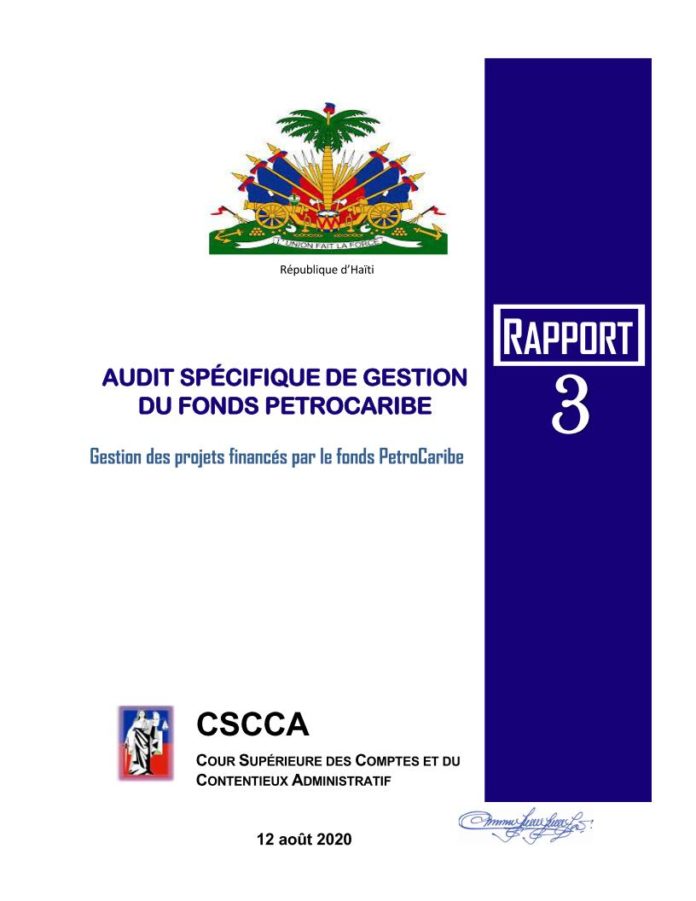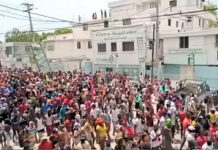
On Mon., Aug. 17, 2020, Haiti’s Superior Court of Accounts and Administrative Litigation (CSCCA) released a third huge report on the embezzlement and squandering of $1.74 billion in funds from the PetroCaribe Fund over eight years from September 2008 to September 2016.
The latest report, amounting to a voluminous 1,064 pages and dated Aug. 12, 2020, comes after two previous CSCCA reports in January and May 2019, and two Senate reports in August 2016 and October 2017.
In greater detail than its predecessors, the latest report reviews minutely the “irregularities” in the execution of projects carried out by 13 ministries, 15 state agencies, the prime minister’s office, and the state university.
Three presidents oversaw the often untracked spending: René Préval, Michel Martelly, and Jocelerme Privert. Martelly’s prime ministers (Garry Conille, Laurent Lamothe, and Evans Paul) burned through most of the money (72.21%). Préval’s prime ministers (Michèle Duvivier Pierre-Louis, Jean-Max Bellerive) spent 25.87% and Privert’s PM Enex Jean-Charles a mere 1.91%.
The CSCCA’s recommendations on page 22 are very succinct and understated:
General recommendations to Parliament.
-
-
- In the short term, put in place mechanisms to recover sums of money misused in order to allow the Republic of Haiti to possibly reduce its debt to Venezuela;
- In the medium term, carry out a profound reform on the supervision of the awarding and management of contracts for the implementation of public projects;
- In the long term, review the framework for ethics and ontology towards elected officials and servants of the State in order to promote greater transparency in the management of public funds.
-
Recommendations addressed to the audited public institutions
-
-
- Carry out diligent internal investigations in order to determine the possibility of recovering sums from firms and administrators of public funds, in particular, in the case of irregularities that have caused harm to the community: favoritism in the awarding of contracts, unjustified disbursements, 2% withholding at source (income tax) on installments, but not paid to the DGI [Haiti’s tax authority];
- Engage the responsibility of the Authorizing Officers who succeeded one another at the head of the institutions and who were involved in the management of the PetroCaribe Fund for having engaged the State in irregular transactions within the framework of the development and/or management of projects;
- Strengthen internal control mechanisms to ensure that certain State servants no longer carry out acts which violate the laws and regulations in force and which are detrimental to the community.
-
While the exhaustive report is available on the CSCCA’s website (cscca.gouv.ht), it is presented in a practically unreadable format, where one must click a box to view each of the over 1,000 pages. In order to allow our readers to more easily review this important document, we have placed it on the Haïti Liberté website, embedded in this article.
The PetroCaribe Fund was a huge savings account where 40% of the revenues Haiti owes Venezuela for the sale of some $4.3 billion of oil products from 2008 to 2018 was placed. The solidarity fund, which was earmarked for projects benefitting the Haitian people, was repayable at 1% interest after 25 years.
Instead of building roads, canals, schools, hospitals, and clinics, the monies were frittered away through vast corruption and incompetence. This has enraged the Haitian people who continue to demand “Where did the PetroCaribe money go?” and call for trials of those responsible, but until now, not a single official has been charged.
Previous CSCCA reports point to companies that were owned by President Jovenel Moïse as the recipients of millions of dollars of embezzled PetroCaribe funds.










